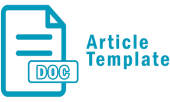Analysis of Radicalism Critical Discourse in Facebook Social Media
Abstract
Social Media as a new forum for users to exchange information. Social media provides facilities that are easy and fast for its users. This has become an opportunity for radical groups to instill radicalism with free discourse patterns, but it has moved towards religious and political dynamics today. Uncontrolled social media in sharing information that is not necessarily valid in its distribution will increasingly have an impact on the spread of radicalism discourse texts. This research is proposed to see the series of words and sentences used in the radicalism discourse text. This research can be useful for the government to regulate social media in terms of policy regulation. The text of radicalism discourse that exists in social media can be dissected using Teun A Van Djik's analysis model which divides it into three structures, first the macro structure, the superstructure and the micro structure. This analysis model will also reveal the ideology that underlies a text. The purpose of this study is to determine the macro structure, superstructure and micro structure in the text of radicalism discourse. The benefits gained are being able to provide knowledge about radicalism on Facebook social media, providing encouragement to prevent radicalism efforts and images to the government in formulating policies to use social media as a preventive measure and re-establishing de-radicalization activities.
Keywords
Full Text:
PDFReferences
Aman, I. (2008). Bahasa dan kuasa: Analisis wacana barisan nasional dalam pilihan raya umum Malaysia ke-11. Akademika, 72(1), 69–96.
Ariandy, M. (2019). Kebijakan kurikulum dan dinamika penguatan pendidikan karakter di Indonesia. Sukma: Jurnal Pendidikan, 3(2), 137-168.
Bakhtiar, B. (2017). Hukum dan pengendalian prilaku sosial. Al-Qalb: Jurnal Psikologi Islam, 8(2), 174-182.
Ependi, R. (2019). Modernisasi pendidikan islam: Latar belakang, cakupan dan pola. Jurnal Al-Fatih, 2(1), 79-96.
Herlina, L. (2018). Disintegrasi sosial dalam konten media sosial facebook. Temali : Jurnal Pembangunan Sosial, 1(2), 232–258.
Kokaz, N. (2001). Between anarchy and tyranny: Excellence and the pursuit of power and peace in ancient greece. Review of International Studies, 27(5), 91-118.
Lubis, D., dan Siregar, H. S. (2020). Bahaya radikalisme terhadap moralitas remaja melalui teknologi informasi (media sosial). Aplikasia: Jurnal Aplikasi Ilmu-Ilmu Agama, 20(1), 21-34.
Mekarisce, A. A. (2020). Teknik pemeriksaan keabsahan data pada penelitian kualitatif di bidang kesehatan masyarakat. Jurnal Ilmiah Kesehatan Masyarakat : Media Komunikasi Komunitas Kesehatan Masyarakat, 12(3), 145–151.
Musyafa’ah, N. (2017). Analisis wacana kritis model teun a. van dijk “siswa berprestasi jadi pembunuh”. Modeling: Jurnal Program Studi PGMI, 4(2), 203–211.
Nurasih, W. (2019). Wawasan Al-Qur’an tentang radikalisme dan penanganannya di era milenial. Jurnal Ilmiah Mahasiswa Raushan Fikr, 8(1), 129–138.
Rahawarin, C., dan Arikunto, S. (2015). Pengaruh komunikasi, iklim organisasi dan gaya kepemimpinan transformasional kepala sekolah terhadap kinerja guru sma. Jurnal Akuntabilitas Manajemen Pendidikan, 3(2), 173–188.
Rakhmawati. (2013). Pola pengasuhan santri di pondok pesantren dalam mengantisipasi radikalisme: Studi pada pesantren ummul mukminin dan pondok madinah. Jurnal Diskursus Islam, 1(1), 36–55.
Sari, R. F. (2019). Menyoal kebablasan berpendapat: Malfungsi media sosial sebagai panggung produsage konten negatif. Jurnal Penelitian Pers dan Komunikasi Pembangunan, 23(1), 1-16.
Setiawan, W. (2012). Pola keberagamaan mahasiswa sekolah tinggi agama Islam negeri jurai siwo metro Lampung. Harmoni, 11(4), 34–45.
Watie, E. D. S. (2016). Komunikasi dan media sosial (communications and social media). Jurnal The Messenger, 3(2), 69–74.
DOI: https://doi.org/10.17509/civicus.v21i1.45595
Refbacks
- There are currently no refbacks.
Copyright (c) 2021 Apriya Maharani Rustandi

This work is licensed under a Creative Commons Attribution-NonCommercial-ShareAlike 4.0 International License.
Our journal indexed by :
Jurnal Civicus is published Univesitas Pendidikan Indonesia in collaboration with Indonesia Association Profession of Pancasila and Civic Education/Asosiasi Profesi Pendidikan Pancasila dan Kewarganegaraan (AP3KnI).

Jurnal Civicus is licensed under a Creative Commons Attribution-NonCommercial-ShareAlike 4.0 International License.

.png)




__.png)










